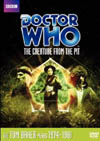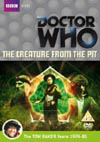DVD Extras include:
This story also marks the debut of David Brierly as the new voice for K9. The change of voice would have been a much better reason for scripting the upgrade from a Mark I to a Mark II K9 than the far less noticeable new shade of grey paint between seasons 15 and 16, but then hindsight is always 20/20. Instead, the "laryngitis" from "Destiny of the Daleks" (story no. 104) seems to be the only scripted reason for the change. Brierly's K9 is not altogether bad, although the contrast still makes one pine for John Leeson's more familiar tones. Unfortunately, the brighter and more emotional characteristics of Brierly's version are artificially emphasized by having him read children's literature loudly when he is introduced. It is also quite jarring to introduce the main characters in the TARDIS with such an unfamiliar voice uttering such uncharacteristic lines while the K9 prop that all this is supposedly emanating from takes such a long time to enter the frame. Given enough time though, Brierly's version grows on you and demonstrates its own strengths. The filmed jungle set that features heavily in the early episodes of this story deserves much praise. The lighting is just right to indicate a foggy day, unlike the eternal artificially lit night-time that appears to be the case in Hinchcliffe era stories like "Planet of Evil" (story no. 81) or "The Face of Evil" (story no. 89). There was a lot of evil in those days. Golly! The humidity of the jungle environment is also apparent, aiding later characters' complaints about the challenges of living in such an environment. The Wolfweeds also deserve mention, as these were quite effectively realised throughout, and provide for some great action sequences squaring off against K9. Apart from the usual sparse smatterings of the Doctor's theme, Dudley Simpson's music seems to achieve its most memorable original bits near the end of the first episode, just before the Doctor's big leap of faith. Although there is a good deal of investigation and mystery pulling our protagonists through the story, it is sometimes unclear that the story is headed in an interesting direction. Keeping the Doctor entirely in the pit for both of the middle episodes is perhaps a questionable move, but thankfully Algernon helps the Creature to keep the Doctor's screen time interesting and entertaining. There aren't really a lot of great performances in this one, but Eileen Way seems to stand out as Karella, second in command to the Lady Adrasta, largely because she plays her role so seriously and believably while most of those around her succumb to going over the top now and then. But there are also notably fun cameos by "Tomb of the Cybermen" director Morris Barry and regular stuntman Terry Walsh as an oddly matched pair of religiously-robed "scientists". Algernon also manages to remain an entertaining and enjoyable character throughout the three episodes in which he appears. The plot of this story remains one of its strengths, and really begins to pay off in the final episode. The Creature Erato, while at times a hit-and-miss mixture of visual effects and studio props, makes its best and most civil appearance yet in the final episode of the story, making very effective use of other characters' voices to become understandable while remaining extremely alien. The Doctor is kept heroically busy solving both social and technical problems, and the TARDIS sees plenty of action, making up for the less than perfect demonstration of the craft during the first episode. A lot of ambitious model work is attempted, with enjoyable results, while the added electronic effects used throughout the story help make "The Creature From the Pit" a successful visual treat. On recent viewing, however, my favourite scene of the final episode has become the climax of the battle over the monopoly of metal, argued out in the outcasts' jungle hut. It is there that this story makes its strongest thematic statement of the ridiculousness of greed, not to mention indirectly demonstrating why a gold standard is not the best basis for human currency: The metal is too rare on Earth to prevent it from being easily monopolized by a few elite, to the detriment of the public common good.
International Titles:Magyar: (A lény a gödörből) vagy "A lény a mélyből"Français: (La créature de la fosse)Русский: "Чудовище из ямы"This story has become available on DVD and VHS video:
Comments on this article are welcome. You may contact the author from this page:
|








